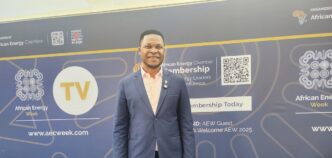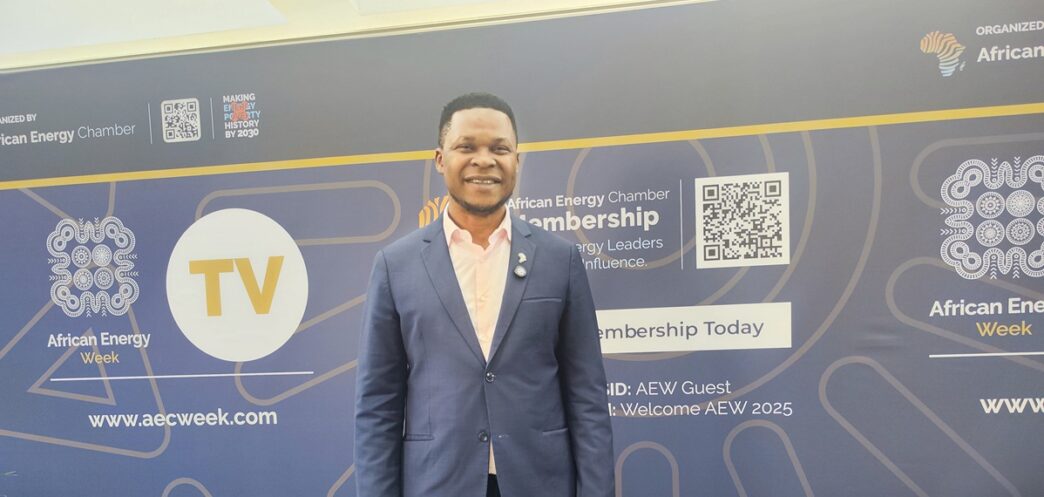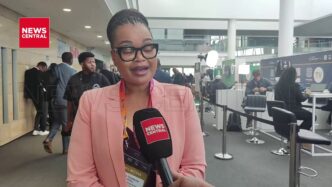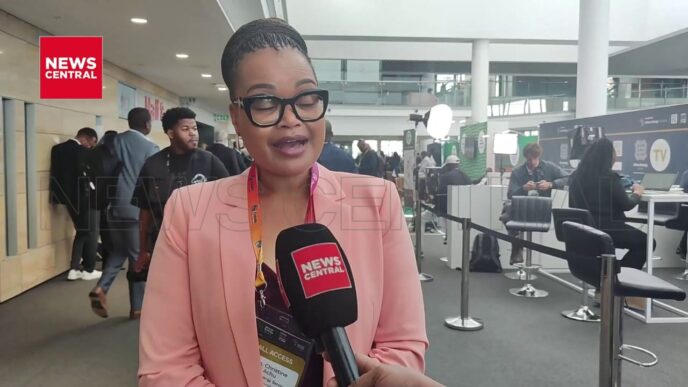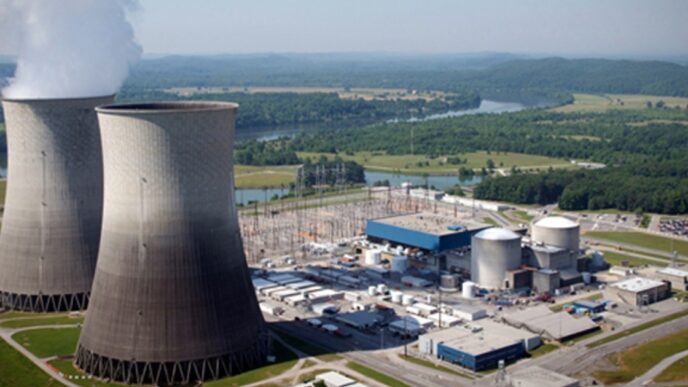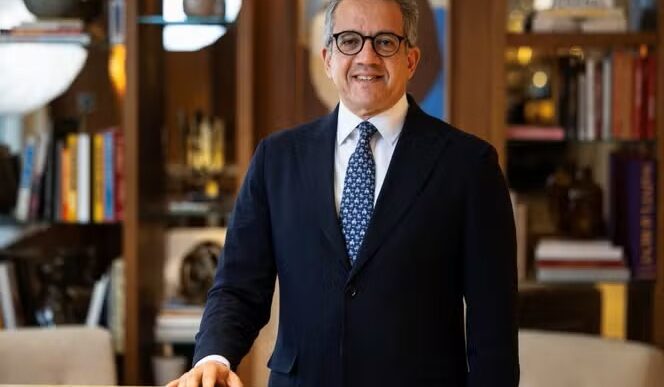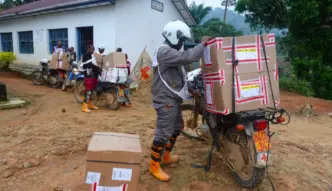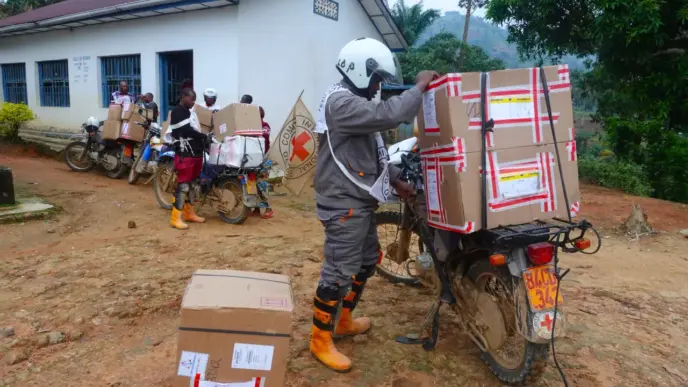The Executive Chairman of the African Energy Chamber, NJ Ayuk, has described Africa as the best destination for investors, stressing that the continent offers unmatched opportunities in the energy sector.
Speaking in an interview with News Central TV at the 5th edition of Africa Energy Week (AEW) in Cape Town, South Africa, Ayuk declared: “Returns on investment, investing in the Gulf of Mexico is less than in Africa. Big returns, Big times, and if this is if there’s one continent where you get super returns, find no places, but Africa. That’s why we are working very hard to be the best place to do business.”
He noted that AEW 2025 has strengthened Africa’s investment narrative and stimulated significant deal-making in the oil and gas industry. “This year gets even better because of deals and deals messaging narrative. We have a strong narrative on Africa and that narrative really works, it’s working. Deals we’ve seen, many oil and gas deals being done in the continent which is benefiting Africans,” he said.
Ayuk highlighted the growing strength of African-owned oil and gas firms: “But even bigger than that African nations and African independents are doing well. Nigeria has more independents than many European countries. You see them here, they are participating and they’re getting a lot of stuff done.”
He further praised the pragmatic approach now being adopted by African governments toward energy exploration. “We have a lot more African governments now really being pragmatic how they think about oil. It’s not us versus them, it’s that how do we incentivise oil exploration? How do we incentivise growth? Because we came out of an era where oil was a bad thing. We shouldn’t talk about the oil and gas industry, we should talk only about renewables.”
Ayuk emphasised that the conference reaffirmed Africa’s commitment to a balanced energy future. “This AEW re-emphasised our commitment to building baseload energy, fighting energy poverty, using oil and natural gas to be part of Africa’s development, and I’m excited about this.”
Ayuk also stressed the need for a balanced approach. “Life has always been about transitions, but let me tell you this, when President Biden came in 2020, in America, their usage of oil and gas, 82% of the electricity capacity. 2025, 82%, if not reduced. So they have developed in the wealthy nations, they should decarbonise, they should use more renewables, we need base load energy, so we need to use more fossil fuels to industrialise and get our people out of poverty,” he said.
He argued that despite repeated commitments, Africa has received little support for renewable projects. “Of course you want renewables, but the promises they’ve always told us around renewables, they just don’t keep those promises. Broken promises, one after another. We went to COP, they said they’re going to give $100 billion, which is nothing for all these poor countries,” he said.
“What happens? We’ve not seen a dime. So you want to tell me, I’ve abandoned my resources and focused on something you can finance, but then we shouldn’t be waiting for aid. But you have $400 billion of green bonds that were done between 2020 to 2024. You know how much got into this continent? Less than 3%. They’re not financing Africa’s renewables. We have the sun, we have the wind, why are we not getting the financing there? So we’re going to have to do it by ourselves,” he added.
The African Energy Chamber boss said oil revenues could play a crucial role in funding renewables on the continent. “It’s like I always say, Wakanda forever is a good movie, but the Black Panther is not coming. If we’re going to have to do renewables, we need to get money out of oil, and then use that money. We could set aside money from oil, use that funds to really drive up renewables ourselves,” Ayuk noted.
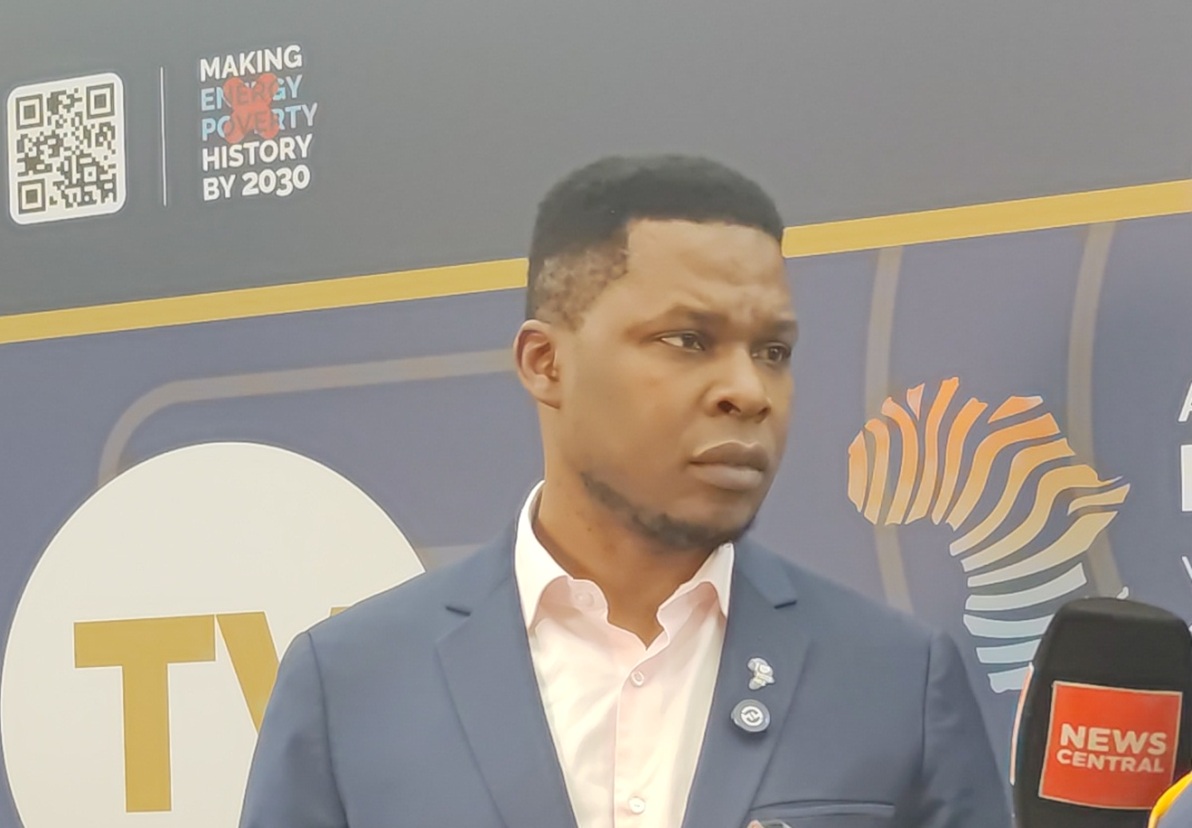
He further urged African governments to focus on building local value chains. “That’s when we do and we really get renewables, that is really African land. Why don’t we build a supply chain around renewables in Africa? The copper is here, so you know what? Let’s finance our mining, our copper mining, lithium, platinum, use that, use the technologies they have if you really want to drive that in Africa, and we build a supply chain in Africa. We can’t just live from one form of energy to another form where we have to be dependent on other people all the time. Africa cannot be a market where you just depend on others. It doesn’t help us,” he said.
Ayuk, called for an “all-of-the-above energy strategy” for Africa, warning against what he described as the politicisation of global energy debates. He said the International Energy Agency (IEA) had misled the world by pushing for an end to oil investments. “The IEA made a big blunder. They politicised energy analysis, and they said stop oil, and stop oil investment, and stop everything. That was wrong, and now they’ve changed their outlook, saying we need $570 billion a year in oil investment. I think we need about $900 billion, because a lot more exploration needs to be done in Africa,” he stated.
He argued that energy should not be politicised, insisting that the consequences of doing so are borne disproportionately by developing regions. According to him, “The problem with energy is that when we politicise energy, it becomes a problem.”
Ayuk emphasised the scale of Africa’s energy poverty, noting that nearly one billion people on the continent lack access to clean cooking, while between 600 and 700 million have no access to electricity. He insisted that Africa must pursue a broad mix of energy sources. “We in Africa just need to have an all-of-the-above energy strategy, because when you have an all-of-the-above energy strategy, you use oil, you use natural gas, you use coal, you use renewables, you use everything to get our people back,” he said.
He also rejected the idea that Africa should abandon fossil fuels while still underdeveloped. In his words, “We can’t say we abandon everything and wait for renewables. The sun wouldn’t shine forever. The wind wouldn’t blow forever. You might need natural gas to power your development. No nation has ever been developed by renewables alone. None, none.”
Ayuk further criticised calls to end oil in Africa, saying it would be tantamount to ending life itself. “To say just stop oil in Africa, it’s saying just stop life,” he said, pointing to the scale of unmet demand in countries like Nigeria. He explained that “90 million people [in Nigeria] without electricity, most of them didn’t know that if you use natural gas, guess what’s going to happen? You could power the country, you could build fertiliser plants, feed with fertiliser, we feed people, and we don’t rely on it for everything we do.”
Ayuk reaffirmed Africa’s non-aligned stance in global geopolitics while calling for greater cooperation within the continent to unlock its energy and economic potential.
He said Africa’s long-standing tradition of neutrality should guide its approach to international relations. He explained that the continent does not need to choose sides between global powers. According to him, Africans have always been part of the non-aligned movement, and he recalled Nelson Mandela’s teaching that “your enemies don’t have to be our enemies.” He stressed that Africa should “work with everybody,” whether Russia, America, or other partners.
Ayuk noted that Africa could draw lessons from Russia’s gas monetisation strategy. He said the Russians had successfully used gas to power agriculture, shifting from being net importers of food to net exporters. He added that the United States had also demonstrated the potential of natural gas by supplying Europe while building the foundation for future industries.
He urged African countries to apply gas resources in new areas such as technology. He argued that the continent should be thinking about using gas “to build big data centres” and to support artificial intelligence, which Africa’s young population could drive forward. If this does not happen, he warned, the continent risks “playing the catch-up game all the time.”
Ayuk stated that Africa should welcome interest from partners worldwide, pointing out that Saudi Arabia and China had shown strong engagement. However, he argued that Africa must also harness its own resources, including what he described as $2.7 trillion of private capital within the continent.
On regional integration, Ayuk was critical of the slow progress under the African Continental Free Trade Agreement (AfCFTA). He said that the agreement is not working because tariffs remain in place and barriers such as visa restrictions still make it easier for Europeans to work in Africa than for Africans to work across borders. He stressed the need to rethink local content policies, arguing that African talent should move freely to where it is needed. For example, he said, Nigeria’s expertise could benefit Mozambique, while Ghanaian professionals could contribute to Sierra Leone.
“We should cut down these barriers for Africans to work together,” he added.


 Trending
Trending 
